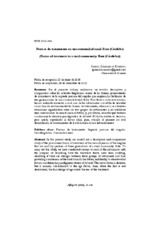Mostrar el registro sencillo del ítem
Formas de tratamiento en una comunidad rural: Rute (Córdoba)
| dc.contributor.author | Granados Romero, Isabel | |
| dc.date.accessioned | 2019-05-10T10:22:49Z | |
| dc.date.available | 2019-05-10T10:22:49Z | |
| dc.date.issued | 2018 | |
| dc.identifier.issn | 2386-9658 | |
| dc.identifier.uri | http://hdl.handle.net/10396/18506 | |
| dc.description.abstract | En el presente trabajo, realizamos un estudio descriptivo y comparativo sobre las actitudes lingüísticas acerca de las formas pronominales de tratamiento de la segunda persona del singular que emplean los hablantes de tres generaciones de una comunidad rural: Rute. Para llevar a cabo este estudio, hemos realizado encuestas a cada uno de los informantes con el fin de describir cómo han ido evolucionando las formas de tratamiento, observar si se advierten variaciones significativas entre los tres grupos de informantes y así establecer unas conclusiones de mirada hacia el futuro, y, por último, observar qué factores condicionan la elección paradigmática de tú/usted. El factor estatus es decisivo, pero queda supeditado al factor edad, pues, cuando el primero no está determinado, el conocimiento de la edad marca el uso del tratamiento. | es_ES |
| dc.description.abstract | In the present study, we carried out a descriptive and comparative study of the pronominal forms of treatment of the second person of the singular that are used by speakers of three generations of a rural community: Rute. To carry out this study, we have conducted surveys to each of the informants with the purpose of describing how the treatment forms have been evolving, observing if there are changes between three groups of informants and thus providing conclusions of the look towards the future, and finally, to observe what factors condition the paradigmatic choice of tú/usted. The status factor is decisive, but it remains subordinated to the age factor, then, when the first is not determined, the knowledge of age marks the use of the treatment. | es_ES |
| dc.format.mimetype | application/pdf | es_ES |
| dc.language.iso | spa | es_ES |
| dc.publisher | UCOPress | es_ES |
| dc.rights | https://creativecommons.org/licenses/by/3.0/ | es_ES |
| dc.source | Alfinge 30, 73-106 (2018) | es_ES |
| dc.subject | Formas de tratamiento | es_ES |
| dc.subject | Segunda persona del singular | es_ES |
| dc.subject | Sociolingüística | es_ES |
| dc.subject | Comunidad rural | es_ES |
| dc.subject | Forms of treatment | es_ES |
| dc.subject | Second person of the singular | es_ES |
| dc.subject | Sociolinguistic | es_ES |
| dc.subject | Rural community | es_ES |
| dc.title | Formas de tratamiento en una comunidad rural: Rute (Córdoba) | es_ES |
| dc.title.alternative | Forms of treatment in a rural community: Rute (Cordoba) | es_ES |
| dc.type | info:eu-repo/semantics/article | es_ES |
| dc.relation.publisherversion | https://www.uco.es/ucopress/ojs/index.php/alfinge/index | es_ES |
| dc.rights.accessRights | info:eu-repo/semantics/openAccess | es_ES |

